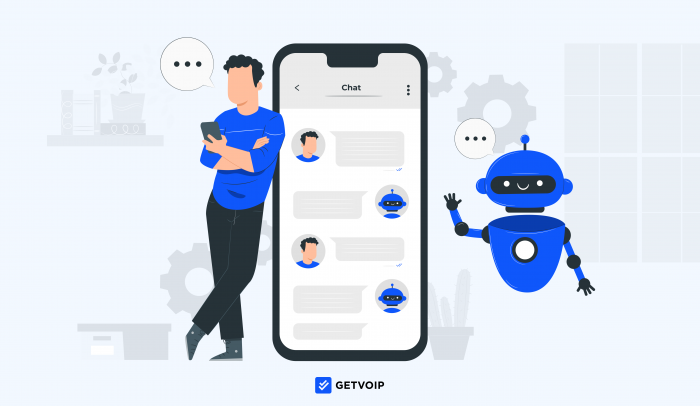According to IBM, chatbots are computer programs that leverage artificial intelligence (AI) and natural language processing (NLP). The express goal of these bots - is to principally; comprehend queries posed by consumers and to automate responses, simulating human conversation.
Performing advanced customer service functions like giving customers recommendations - chatbots can also pull off feats like scheduling, canceling appointments, and even refilling prescriptions in the healthcare field - to name a few possibilities.
Chatbots can even answer FAQs; and help end-users find information needed to satisfy the reason they contacted support in the first place. Typically placed on a website such as a landing, product, checkout, or customer service page - likely the most sizable benefit of chatbots is the fact that they are available 24/7, leading to cost savings and more satisfied customers thanks to them being able to perform various actions without human intervention.
Chatbots can work in any customer service environment, particularly looking to assist in reducing things like high call volumes in contact centers. If contact center management wants to extend convenient customer service options to relieve the stress felt by agents, they're likely already sold on the idea of chatbots.
And a 2023 study conducted by Tido, found that developers of customer service software like chatbots - found that most folks prefer using a chatbot, while 38 percent of individuals said they like chatting with a human.
That same study further found that roughly 88 percent of customers had at least one conversation with a bot. And when it comes to companies implementing chatbots, 19 percent already use them, while 62 percent plan to use them. An additional 19 percent say they don't have plans to implement a bot.
OpenAI and ChatGPT
Founded in 2015, OpenAI has been everywhere as of late. Contact center software and customer service (CX) software developers have been all over the technology. Microsoft gave the for-profit firm a $1 billion investment in 2019, further investing an additional $10 billion in 2023.
All this brings me to the fact that nearly every 'major' and non-major player in the UCC space has added ChatGPT to their roster of capabilities, hoping to boost their CX capabilities. ChatGPT is the artificial intelligence chatbot developed by OpenAI - it launched on November 30, 2022, and is known as the most sophisticated chatbot currently on the market.
GPT-4 Turbo is ChatGPT's paid model and was released in 2023. GPT-4 is the latest most advanced large language model to date and was updated with data through April 2023. GPT-4 is able to digest up to 300 pages of content, allowing it to provide more accurate answers. ChatGPT can also now accept images as prompts and write code in specific languages. GPT-4 has a near endless number of uses, and GPT-4 users can even create and train their own custom bots to perform specific tasks.
Automate, Automate, Automate
While many assume that AI will eventually replace humans at their job - that could not be further from the truth. The express goal of said technology is to assist humans in better performing their jobs.
From answering queries about products to extending post-sale support, chatbots (and voice bots) are seemingly invaluable. They can work to collect data from customers, along with ensuring a quality experience if the logic is sound. Companies can even leverage chatbots for onboarding and automating tasks involved in that process: be it a new customer or employee.
There is also no risk of human error, and bots can handle multiple customers simultaneously. And that is all automated - (freeing up) human agents to perform higher-level customer service tasks, such as when a customer needs to speak to a human for any number of reasons.
Everything from e-commerce to healthcare, real estate, and various other industries might 'handsomely' benefit from reducing long response times, lack of follow-ups from human agents, and other downsides to relying (solely) on humans to perform CX within organizations.
In a way - it appears now that automation holds the potential to turn human agents into super-human agents. Making a reservation at a hotel or restaurant, paying a bill, resolving a complaint, or even connecting with a human - all potential use cases for chatbots, and all these processes can get automated.
Chatbots May Improve Rising Customer Expectations
According to Khoros, 83% of customers are loyal to companies with effective customer service. These rising customer expectations could get remedied if chatbots remain a part of the equation and the experience is sound. It is not enough to merely offer a 'basic' chatbot experience - but rather, for that experience to be memorable.
Not to mention: omnichannel experiences - which can prove invaluable for customers as customers leverage various channels to achieve countless goals. That includes phone, email, social media, and even messaging apps like WhatsApp/Facebook Messenger - which brands are growing to understand is only to their benefit - not their detriment.
The Future of Chatbots
As chatbots leverage a model that trains and makes them better over time - the result is that the experience (for customers) will only get better over time. When considering this, it seems only clever to implement such a tool now.
There are a )ton of tools) that don't require that of developers, both any and low-code solitons that let almost anyone design these conversational experiences set to dominate the future of CX. These tools are convenient and (almost) certainly: help firms of all sizes save money, time, and effort that previously went into hiring time-consuming and expensive developer services.
That energy can now get put into hiring developers to design APIs to enhance chatbots - but not to build the entire experience. After all - access to bots is far greater than ever before. And that should only become more widely available over the coming years.
And that market is slated for much growth, with Gartner predicting that the conversational artificial intelligence (AI) market within contact centers will increase growth by 16% and come with its fair share of benefits. For starters, it will help to reduce agent labor costs by a huge margin.
The fact is that chatbots are something that can help a business beyond what they could have ever imagined, it merely takes the imagination of creative folks to know how to use the technology best to enhance various experiences for both customers and customer service agents.



